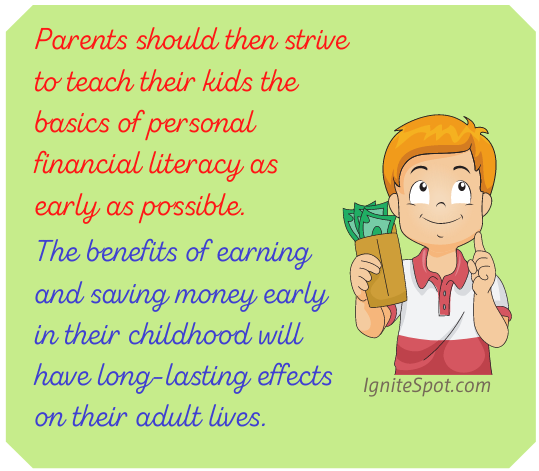
Children aren’t as ignorant about finance-related matters as most parents think! According to a University of Cambridge research, children as young as seven years old can understand the basic concepts of money. Their understanding may be limited to buying their favorite food, toy, or gadget by asking their parents for it, but it’s there nonetheless.
Parents should then strive to teach their kids the basics of personal financial literacy as early as possible. The benefits of earning and saving money early in their childhood will have long-lasting effects on their adult lives.
Their adulthood will be marked by financial responsibility, a vital trait in staying out of crippling debt, saving for a nest egg, and enjoying a full life.
Just imagine a pre-teen child or a teenager saving money from his earnings for his college fund. Then, in his 20s, start saving for his retirement fund. What a difference it will make!
Parents have the moral responsibility of teaching personal financial literacy to their children for many reasons. Personal finance is challenging enough for adults to navigate on their own, particularly with the increasing complexity of financial systems. Children should then be provided with the appropriate guidance in earning their own money and handling it responsibly.
Children who navigate personal finance on their own are less likely to recognize and reduce the risks that come with earning money, too. These risks include spending all of their money in one go and spending their earnings even before earning it (i.e., going into debt).
Think about the consequences of the absence of personal financial literacy lessons when children start earning their own money. An article by Martha C. White revealed that over 20 percent of renters 18 to 24 years old fell short of their budget by $100 or more monthly. She also wrote that people born between 1980 and 1984, or Generation Y, carry $5,689 more credit card debt in comparison with their parents at the same age.

And then there’s the student loan debt crisis of the 21st century! The latest statistic shows the seriousness of the crisis, with the average being $29,200 for the Class of 2018. In fact, student loan debt amounts have ballooned to $1.56 trillion – the second-highest consumer debt category!
Note: Mortgage debt is the highest consumer debt category. Credit cards and auto loans come in third and fourth places. But these also cause for concern that parents should teach their children, albeit in simple terms.
With that being said, here are the 50 creative ways that children can start earning and saving money. Parents keep in mind that you should provide close guidance when your children choose their income-earning ways!
Indeed, the jobs they chose must be safe and appropriate for their age, and their workplaces are also safe. This isn’t about being a helicopter parent; it’s about being a responsible one! You shouldn’t let your children into other people’s homes, for example, without vetting the homeowners’ trustworthiness.

1. The consignment of toys allows children to make money from their toys while recycling them. Just drop the toys for consignment at the seller’s site, let them promote the items and give your children a cut of between 30% and 40% of the sales price. (Investopedia)

2. Raking leaves is suitable even for younger children with basic gardening skills, requires little more than a rake, and teaches kids about work ethics. Parents, check in with your children once in a while! Ensure that they complete the job, which can pay between $5 and $30 per hour. (ShowKidsTheMoney.com)

3. Mowing lawns are best for teens who already know their way around motorized equipment. Teens can mow lawns as a summer job, a recurring job, or as a one-time job, such as when the neighbors are on vacation, and earn $10 to $40 depending on the lawn’s size. (kidsmoney.org)

4. Various yard work is also needed by homeowners, either during the spring or summer season or the entire year. The jobs can include everything from raking leaves and weeding to planting, mulching and arranging pots, and with pay ranging from $15 per week to $20 per job depending on the actual tasks. (Angie’s List)

5. Weeding is suitable for older children and teens, and it’s something that pays well, too, with the going rate of about $25 to $50 per hour for 1-5 hours of work. Your children should find plenty of weeding opportunities around the neighborhood during the summer and spring season when homeowners want their yards looking spiffy. (Kahler Financial Group)

6. Shoveling snow requires similar skills as raking leaves, although it can be more physically challenging due to the weight of the shovel and snow. Depending on the size of the lawn or driveway, older children and teens can earn $25 to $75 per hour. (Kiplinger)

7. Carwash services can be offered by entrepreneurial children with little experience and tools for the job. All that’s needed are a garden hose, buckets and sponges, and soap to start a car washing business, and older children and teens can offer the service by going door to door. (Passive Family Income)

8. Washing windows can also be done with the same tools as washing cars but with the addition of a squeegee. If pre-teens and teens can get regular customers, they can earn as much as $18 to $20 per window depending on the size and type of work. (Financial Freedom)

9. Cleaning houses can be a demanding job, but it pays well – about $14 per hour, depending on the tasks to be done and the scope of the work. Teens are more suited for the job because of their physical and mental capacity, and they can clean houses for older adults, families, and couples with busy schedules. (ZipRecruiter)

10. Animal sitter jobs are great entry jobs for children as young as ten years old, especially if they already have experience taking care of their pets. The jobs can vary greatly, from feeding and walking pets at regular intervals to staying with them at their owners’ houses, with the pay ranging from $20 to $30 per day. (HomeGuide)

11. Offering lemonade is perhaps the first thing that comes to mind when children want to earn money because it requires little by way of capital yet brings in money. The ingredients, glasses, and table are already available in the house, and the children can set up their stand in front of the house. (APR Finder)

12. Selling baked goods is the next step for teens who have succeeded at a lemonade stand, although selling lemonade and baked goods simultaneously makes good business sense, too. Older children and teens with baking skills can sell their goodies in front of their homes, online, and in a store, too. (The Penny Hoarder)

13. Giving a puppet show is a good start in show business, too, since it encourages children to overcome their shyness and explore their creativity in creating characters and storylines. They can charge the viewers with a fixed fee for every live performance, as well as monetize the shows on YouTube. (Mother Earth News)

14. Playing a musical instrument in public, known as busking, was the way to fame and fortune for Justin Beiber, and it may well be an excellent start for your child, too. Children earn through donations from passersby, and their busking hours also mean extra practice time. (Sonic Bids)

15. Joining farmers’ markets is yet another way of letting kids earn their own money, perhaps from their gardens, while also teaching them essential marketing and selling skills. Ask about children being allowed to set up tables in the farmers’ markets, and then help them in setting up their booths and pricing their produce. (Storey)

16. Having a garage sale is more upfront than consigning toys and other stuff since the children can do everything from the comfort of their home. Parents can help their children choose the stuff that they want to sell, and then set tables and signs on the lawn for the garage sale – easy-peasy, indeed! (One Cent at a Time)

17. Making and selling homemade décor and crafts can be a family activity, too, aside from a money-making scheme for the children. The products can be sold at farmers’ markets, in front of your home, and online! Using the platforms Facebook and Etsy.com, too, will widen the market exposure. (Pinterest)

18. Creating and selling holiday-themed items also makes business sense, too, since there are so many holidays year-round and there are a plethora of products to make. Children and teens can make sweet treats like chocolate truffles for Valentine’s Day, baked goodies for Christmas, and egg dye kits for Easter. (Small Biz Trends)

19. Recycling items is something that every child from toddlers to teens can participate in and, thus, it becomes a bonding moment for siblings while also being an income-earning plan. Nearly everything in household trash bins can be recycled – soda cans, newspapers, and glass bottles – so your children don’t have to look far. (IPPEI)

20. Babysitting is a popular job for pre-teens and teens because it’s a job that grows by word-of-mouth – if a babysitter builds an excellent reputation, more families will make contact. We suggest getting them into Red Cross babysitting classes to prepare them for the job, which can pay nearly $11 per hour. (PayScale)

21. Being on a paper route will not only bring in income for children with bike-riding skills, but it will also teach responsibility, come rain or shine. The delivery can be done daily or weekly while the number of deliveries can range from 35 to 700 households/offices, while the income ranges from $150 to $500 per week. (Chron)

22. Working in the retail industry brings with it opportunities to dabble in a wide variety of jobs, such as cashier, customer service representative, sales associate, and merchandising. But parents should check about the legal requirements, such as minimum age and workers’ permits. (Chron)

23. Working in the family business is arguably the best option for children because their parents can keep an eye on them while teaching business management skills. Parents, be sure to check that you comply with labor and tax laws when hiring your children in your family business. (Kitces)

24, Being a lifeguard comes with great responsibility, but it brings in the money, too, and allows teens to socialize with others and build up their résumé. But it requires a lifeguard training certification with the rules varying by state, such as a minimum age of 15, as is the case for the pay (starts at $12.77 per hour) (Mesa Parks)

25. Getting a job as a golf course worker is an excellent idea because there are plenty of possible part-time jobs, including maintenance staff, bag room staff, valet, caddie, waiter/bartender/busser, and kitchen staff. Every job has specific roles and responsibilities, but most of them don’t require formal training. (NextGenGolf)

26. Being a grocery store bagger is an ideal entry-level job for teens since only minimal skill is required, yet it provides opportunities to learn more about customer service. The pay varies from $7.25 to $9 per hour, and the job itself comes with little risk of injury. (Job-Applications)

27. Getting a job as a fast-food server or cashier is also among the popular first-time jobs for teens because it suits their physical energy. While the wage varies between states, it can range from $7.25 to $8.50 per hour, and there’s an opportunity to earn more as a manager. (CNBC)

28. Operating amusement rides are for older teens who have excellent attention to detail, a strong sense of responsibility, and a stickler for safety procedures. Plus, the amusement park is a fun place to work, and it’s where teens can meet their peers after work. (Zippia)

29. Getting a job as a camp counselor can be a badge of honor for many teens who have been to summer camp for most of their childhood. The transition from camper to counselor can be relatively straightforward, too, while the job itself means spending time in a place filled with happy memories and earning as much as $20,482 per year. (Glassdoor.com)

30. Driving other people around or delivering products to their doorstep pays well, too, with the average wage being $14.66 per hour. Of course, it demands a driver’s license and excellent driving skills, but it’s a rewarding job, especially if you’re helping disabled or elderly clients. (Monster.com)

31. Online jobs are a dime a dozen with parents ideally assisting in the process for safety reasons, especially against scams and sexual predators. The choices include jobs as a call reviewer, a music reviewer, a customer service representative, and a brand ambassador. (Millennial Money)
32. Being a nanny requires more training in child safety than being a babysitter, aside from the increased responsibilities around the house. Teens with babysitting experience will, nonetheless, thrive in nanny jobs during the summer, even become a future career. (Very Well Family)

33. Selling stuff online exclusively is an excellent option during the pandemic because there’s less exposure outside, but your teens continue earning money. Nearly everything, such as comic books, used clothes, and baked goods, can be sold on eBay, Facebook, LetGo, and Offer Up, among others. (Leah Nieman)

34. Playing videogames and being paid for it is a win-win situation for teens and their parents! Teens can also play in online tournaments with prize money at stake, but they can also stick to testing videogames for errors, bugs, and glitches. (Tough Nickel)

35. Doing research is an excellent income-earning opportunity for older children and teens who like research, whether it’s for academic purposes or otherwise. Teens may even be able to offer research assistance to teachers and college students, usually simple tasks like online data verification or questionnaire distribution. (Well Kept Wallet)

36. Writing about personal experiences, food, and fashion reviews, and other topics in a monetized blog bring in the money, too. The content should be engaging and exciting for readers to come back, and advertisers to put in their ads. (Food, Fun and Faraway Places)

37. Selling works of art, such as photos, paintings, and sculptures, is akin to busking except with tangible items. There’s no minimum age required! Kids can sell their artwork in art galleries, on social media, and in farmers’ markets. (Digital Photography School)

38. Vlogging through YouTube videos brings in serious money from advertising income and product endorsements. Parents must guide their kids with regards to content to avoid unwarranted and unwelcome attention, as well as encouragement because a popular YouTube channel isn’t built in a day. (Home Educators Resource Directory)

39. Being a price comparison shopper is an ideal job for a teen who likes to shop and who has the patience for it. As the name implies, it requires making comparisons of prices of individual products at different stores, such as Amazon and Wal-Mart, and making recommendations. (Career State University)

39. Cooking meals for other people, such as elderly and disabled persons who have little energy for it, is also a viable job for teens whose cooking skills are above par. Teens can start their culinary careers in this manner while also building their clientele and expanding their skills. (The Work at Home Woman)

40. Digitizing film-based photo service is so easy that a tech-savvy pre-teen or teen can do it for profit! Many families have old photos that are damaged, faded, and in danger of being lost, so digital storage and prints are appreciated. (Busy Budgeter)

41. Creating a useful app is a job for the tech-savvy child with excellent coding skills. But parents should caution their teens against a get-rich-quick scheme because the apps’ popularity can be unpredictable. (App Institute)

42. Creating photobooks only requires a camera and a photo app, as well as a great aesthetics and good rapport with clients. But it can also be done by collating other people’s photos and making them into a digital scrapbook or a real one. (Artifact Uprising)

43. Testing websites is a step up testing videogames, but it shares similarities, such as the need for prompt feedback. We suggest UserTesting, a site where website owners ask others for their feedback about the design, functionality, and other aspects of their sites; testers can earn as much as $10 per test lasting for 10 minutes or so. (UserTesting)

44. Cleaning bathrooms is a more manageable job than cleaning houses, but it pays well, too. The homeowner may supply the cleaning tools and supplies, which means less expense, but they can also be bought at affordable prices. (HuffPost)

45. Giving music lessons to younger children is safer than, say, busking because these are conducted in the house, not to mention that the income is predictable (fixed fees). We suggest offering a low rate to attract clients without compromising the quality of service. (The Penny Hoarder)

46. Tutoring peers and younger children are also a viable income-earning opportunity for teens with academic ability in subjects like math, science, and English. Classmates and schoolmates are usually the first clients, and the tutoring lessons can also be conducted online. (Dream Home Based Work)

47. Helping the elderly is a satisfying job because you’re doing good deeds while being paid for it. Several responsibilities come with the job, too, such as checking up on them, keeping them company and attending to their needs, including running errands. (Indeed.com)

48. House-sitting can be as straightforward or as challenging to teens depending on the scope of work, but it’s an excellent way to earn money. Teens can approach neighbors who are going on vacation and offer to pick up their mail and packages, take care of the lawn, and check the security system, among others.

49. Selling used golf balls can be a sideline from the golf course jobs or a standalone job on its own. It’s so easy, too, since children only need to look for stray balls, clean them up and sell them for as much as $1 retail. (GolfLink)

50. Offering trash can services is the ingenious way an 11-year old made money for his college fund (Curb Cans). Many kids are strong enough to haul away trash bags, perhaps two at a time, to the dumpster or corner, and then be paid for it. (CNBC)

There are plenty more creative ideas for children and teens to earn their own money, from chopping firewood to designing websites. The trick here is to assess your child’s talents, aptitude, and interests, discuss the ways he can profit from it, and make a plan.








